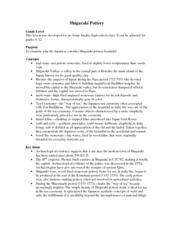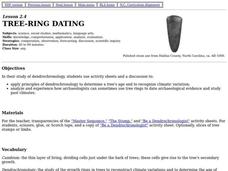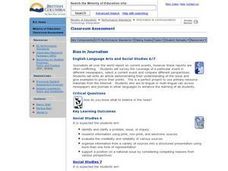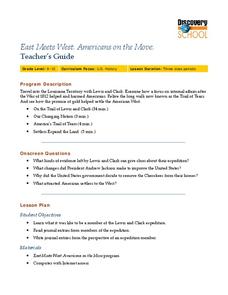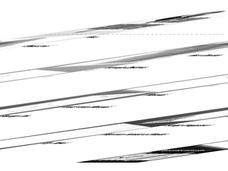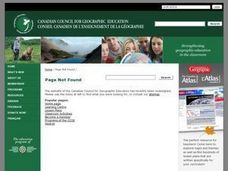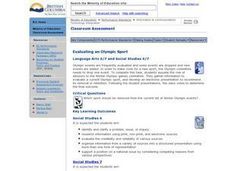Curated OER
Shigaraki Pottery
High schoolers write position papers from the point of view of a Shigaraki art collector in this lesson on pottery techniques found in Japan between the Kamakura and Muromachi periods.
Curated OER
Social Studies:Anglo-Saxon Dress Accessories
Students discover the materials and designs used by Anglo-Saxons. By examining an ancient village, they determine materials and shapes most frequently used to make brooches and strap fittings. Finally, students draw pictures of the...
Curated OER
The Vikings: Woodquay, Dublin
Students view the progamme that leads them through the process of researching an historical site. They are given the deifinition of an archaeologist. Students watch as two ten year olds are given the task of finding out as much as they...
Curated OER
Tree-ring Dating
Learners complete activity sheets and participate in discussions while they study dendrochronology. They determine a tree's age and recognize how the climate varied over time.
Curated OER
Chinese Games
Students investigate the concepts related to the development of Chinese Games. They work with the teacher to point out important events in history that are related to their development and the influence of games upon the Chinese culture.
Curated OER
Culture Everywhere
Students study their culture while filling in a chart that shows how culture meets basic human needs. They examine the role of archaeologists in studying people from past cultures.
Curated OER
Making Good Decisions
Students practice balancing different interests involved in social problems. In this informative lesson students are given social problems and come up with realistic solutions based on the advantages and disadvantages of each.
Curated OER
By Land or by Sea...or Both?
High schoolers research a video and participate in a discussion. In this watercraft instructional activity students review material and answer questions about what they learned.
Curated OER
Ancient Man in Asia
Seventh graders analyze and synthesize information about major historical developments by interpreting data, evaluation sources of information, identifying and comparing experiences and perspectives from multiple cultural perspectives.
Curated OER
Then and Now: Art or Fact
Students complete worksheets about Parliamentary procedure and institutions. They research artifacts, and write a class play based on one artifact.
Curated OER
Refugees
Sixth graders use the internet as well as personal interviews to research refugees and refugee status from a Canadian and international perspective.
Curated OER
The Lott House - a History Mystery
Students read a newspaper article about the historic Lott House in Marine
Park, Brooklyn. They study the history of slavery in New York and uncover the secrets of a historic Brooklyn farmhouse that kept slaves and later protected them...
Curated OER
Bias in Journalism
Learners evaluate the credibility and reliability of various sources. Students survey the coverage of a particular event in different newspapers, select a current event and compare different perspectives. They write an article...
Curated OER
East Meets West: Americans on the Move
Students examine the settlement of the Louisiana Territory. In this Westward Expansion lesson, students watch segments of the Discovery video "East Meets West: Americans on the Move". Students conduct further research pertaining to the...
Curated OER
Looking for Clues
Students infer the cause of a shipwreck based upon information about artifacts found in the wreck. In this marine archeology instructional activity, students use an inventory list to infer the cause of a shipwreck. Students discuss the...
Curated OER
Shipwreck Mystery
Students study web pages on a shipwreck then locate where this took place on a map. In this marine archaeologist instructional activity students examine what clues archaeologists use to find the location of a shipwreck and what they...
Curated OER
Paleo-Diving
Students study sinkholes and how they are associated with paleoamerican settlements. For this underwater exploration lesson students explain how sinkholes are formed.
Curated OER
Why is the Past Important?
Students explore, examine and study why it's important to study the past and connect this importance with reasons why we should learn from the past and how cultures have changed over the years. They bring an object, photograph or a...
Curated OER
Mystery of the Real Robinson Crusoe Solved
Students explore the location of the campsite of fictional character Robinson Crusoe. In this ESL lesson, students read an article that discusses the whereabouts of Robinson Crusoe's campsite, then have a class discussion on the...
Curated OER
Archaeology at Woods Canyon Pueblo
Eighth graders research information about the archaeology at Woods Canyon Pueblo, identifying different terminology. Students make a hypothesis about why the ancient Pueblo people chose to live. Students conducts research to support...
Curated OER
Scientific Inquiry
Students make inferences about what activities occur at different places in school. They form a hypothesis as to how space is used. They simulate how archeaologists explore past people by designing and conducting a research project.
Curated OER
Evaluating an Olympic Sport
Students research the political context of the Winter Olympics in general and within certain countries in particular. They read authentic, published articles on the topic from the Internet and add this information to the spreadsheet as...


